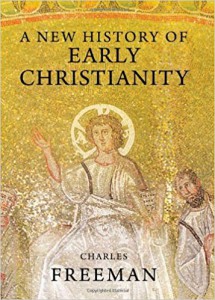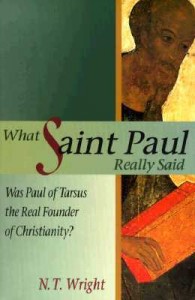[First posted 2012; reposted for review during the Christian lenten season.
Whenever we can’t do better than the writer of any article, we do the next best thing: feature the whole writing, or present excerpts from it.
One of our highly recommended books on Christian history is Charles Freeman’s A New History of EARLY CHRISTIANITY. Our hope is that our readers will be encouraged to get their own copy for their study and library after having a taste of parts of this highly recommended book.
Chapter Five of Freeman’s history is titled: What did Paul Achieve? Condensed and lightly edited. Instead of posting separate articles, we are listing them all here, please check them all out, it will be worth your time to get to know this towering figure who really was the founder of Christianity. Find out if true!
- Revisit: Paul 2 – From Saul to Paul, from historic Jesus to cosmic Christ
- Revisit: Paul 3 – Trouble in missionary journeys
- Revisit: Paul 4 – You foolish Galatians!
- Revisit: Paul 5 – Conflict with the Jews, and emerging Pauline theology
- Revisit: Paul 6: Founder of Gentile Christianity
—Admin 1]
————————————
PAUL DOMINATES ANY HISTORY OF EARLY CHRISTIANITY.
He is the loner who made Christianity universal, the authoritarian who wrote in terms of the equality of all before God. He transformed the spiritual teacher of Galilee into the crucified and risen Christ. Yet it is impossible to write more than a fragmentary account of his life. The sources that survive, perhaps six or seven letters of the many he must have written, and the narrative of his activities in the Acts of the Apostle, are not full enough even to provide an accurate chronology. The context in which his letters were composed can only be guessed at and it is difficult to find a consistent theology in them. Even though there is a tradition which portrays Paul as if he were a detached scholar, his theology is deeply rooted in his frustrations. His personality was complicated and his relationship with others were often tempestuous. All this makes it challenging to provide a fair assessment of his achievement.
As for many ‘teachers’ in the Greek world, Paul’s fame meant that a variety of texts were later ascribed to him. Only seven of the so-called Pauline letters of the New Testament are now fully accepted as genuine:
- Romans
- 1 & 2 Corinthians
- Galatians
- 1 Thessalonians
- Philippians
- Philemon
The earliest surviving letter, that to the Galatians, was probably written in AD 49; the most mature and influential statement of Paul’s theology, the Letter to the Romans, in about 57 and his last surviving letter, to the Philippians in 61 or 62. These letters provide direct evidence of Paul’s responses to the Christian communities with whom he had contact. They are the primary sources of Paul’s life and beliefs even if one can never know how representative they are of his total output. Although the personality of Paul keeps breaking through (in all its rawness in Chapter 4 of 1 Corinthians or the Letter to the Galatians, for instance) and at times his eloquence reaches an intensity which places the letters among the finer literary achievements of the ancient world, they are steeped in the rhetorical conventions of his time. Historical accuracy may have been sacrificed to the self-dramatisation that was necessary to make an impact on his readers. As a documentary account of events they must be treated with caution.
The Acts of the Apostles, the second half of which features some account of Paul’s travels and his encounters with the emerging Christian communities, was probably written some thirty years after the events it describes. Its author, Luke, may even have been a companion of Paull, or close to those who were, and he covers events in relative detail from between AD 50 and 60 when Paul arrives, under armed escort, in Rome. It is not known how many letters of Paul, if any, Luke himself had seen or whether he had seen others which are now lost to us. (There is not a single mention of Paul’s letter writing in Acts.) Many scholars discount Acts as accurate history. it is certainly true that Acts is selective, many events are not clearly described and Luke may have created a much more harmonised life of Paul than the letters suggest. One estimate is that while Chapters 1-8 cover the events of three years, Chapter 9-28 stretch over 25 and concentrate on relatively few events within that time span. The tensions with the Corinthians, which play a major part in Paul’s letters, are not mentioned in Acts at all. In short Luke never set out to provide a biography of Paul: rather his aim, if one takes the text as a whole, is to describe the progress of the gospel, highlighting the events which he believed contributed to this. Yet, there is a narrative that does outline journeys of Paul that can be traced on the map. Above all Acts provides a vivid picture of the struggle that Paul had with the communities he visited and the turbulence of his experiences fits well with the passion of the letters.
Even Paul’s birth date can only be guessed at. Acts refers to Paul as ‘young’ at the time he began persecuting Christians in the AD 30s and his gruelling missionary journeys of the 50s suggest a man no older than his 40s so the first decade of the century seems most plausible. His background and education reflect the melting pot that the east had become. He was born, as a Jew, in Tarsus, a lively trading city that was capital of the Roman province of Cilicia. He may have absorbed, in his childhood or later, an education in rhetoric, including the effective writing of letters, and a smattering of Greek philosophy, above all Stoicism and, perhaps, Platonism. He was sent to study in Jerusalem at the school of the well-known teacher Gamaliel. He must have picked up Aramaic while he was living in Jerusalem but he later refers to himself as a Pharisee and this suggests that he had made a rigorous study of the Torah in the original Hebrew. Nevertheless his own use of scriptures in his letters always draws on the Greek version, the Septuagint.
It is hard to imagine a greater contrast in Jewish backgrounds than that between Paul and Jesus.
- Paul was a Roman citizen, brought up in a Greek-speaking city and at ease with urban life. He was well educated and aware of two competing cultures, Greek and Jewish.
- Jesus had no education other than what he had absorbed from the synagogue, his background was rural and remote from city life, and his region appears to have been untouched by the Greeks.
- Paul was never tolerant of others and was unlikely to have been able to grasp, or even be sympathetic to, the very different context of rural Galilean Judaism.
- Jesus’ life and teachings simply do not figure in his letters and speeches.
Perhaps the most intriguing feature of Paul’s background is his Roman citizenship. By this time the whole of the free population of Italy had been granted Roman citizenship and many Italians had migrated to the Greek east rather as colonists (Philippi was an established colony of citizens, for instance), merchants or administrators. Roman citizenship among the native populations of the east, on the other hand, was still rare. Citizenship could be granted to distinguished individuals, as it was for Josephus, the Jewish historian favoured by the Romans, but Paul would never have qualified on his own merits. However, it was a remarkable feature of Roman law that once a master freed his slaves their descendants acquired full citizenship. In all likelihood Paul was the son of a freedman, one released from slavery by Roman master. When he was in Jerusalem he may even have attended the ‘Synagogue of the Freedman’ mentioned in Acts 6:7 — Jews from Cilicia are specifically mentioned as members of its congregation. His references to slavery, the coming of Christ for all, ‘slave and free’, and his support for Onesimus, the escaped slave on behalf of whom he writes to his owner Philemon, need to be read in light of this probability. To have an elevated position as a Roman citizen but only because one’s father had been a slave left one in an ambiguous social position. Perhaps this explains why Paul so often felt himself an outsider.
Next: Revisit: Paul 2 – From Saul to Paul, from historic Jesus to cosmic Christ


